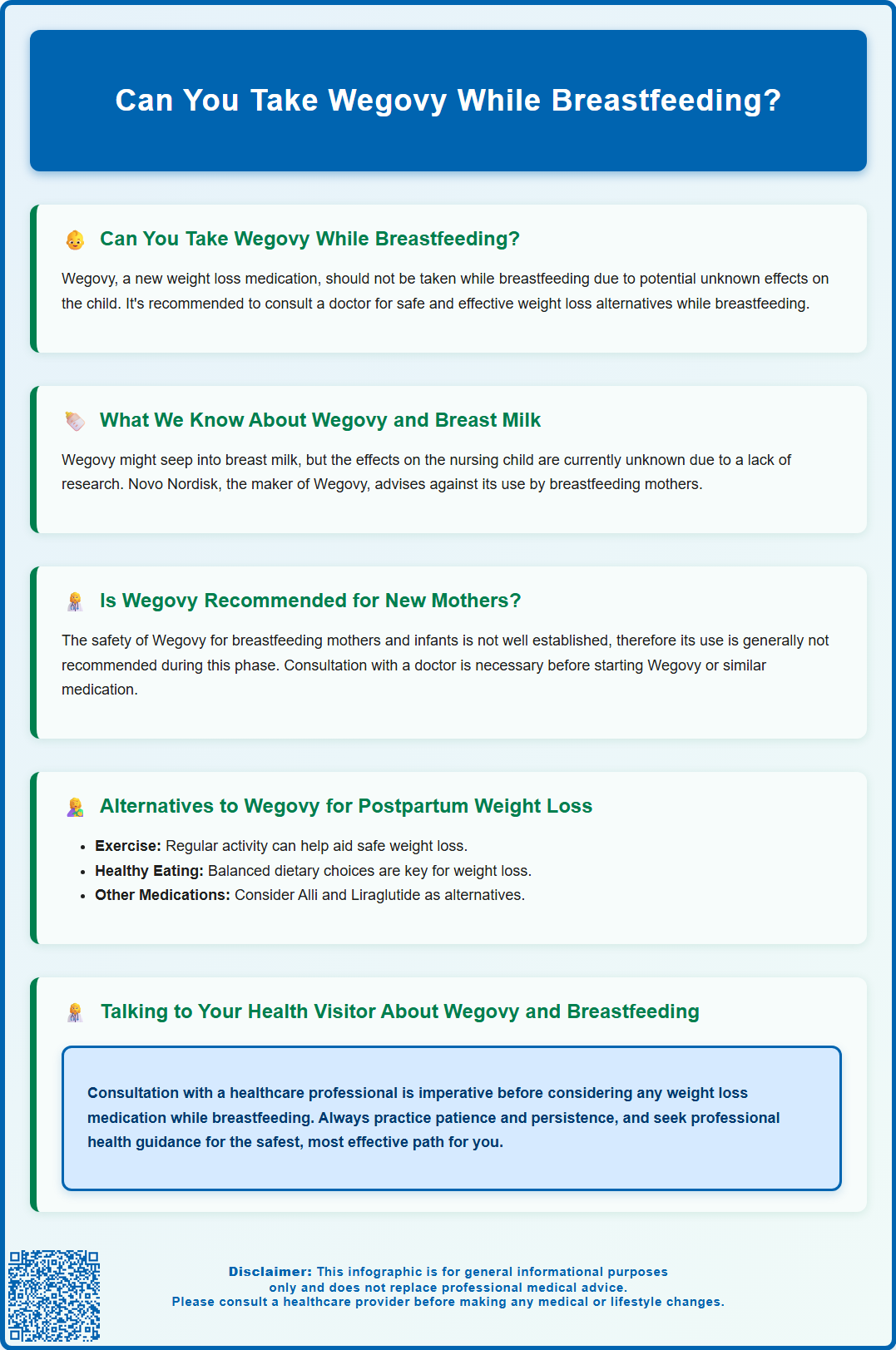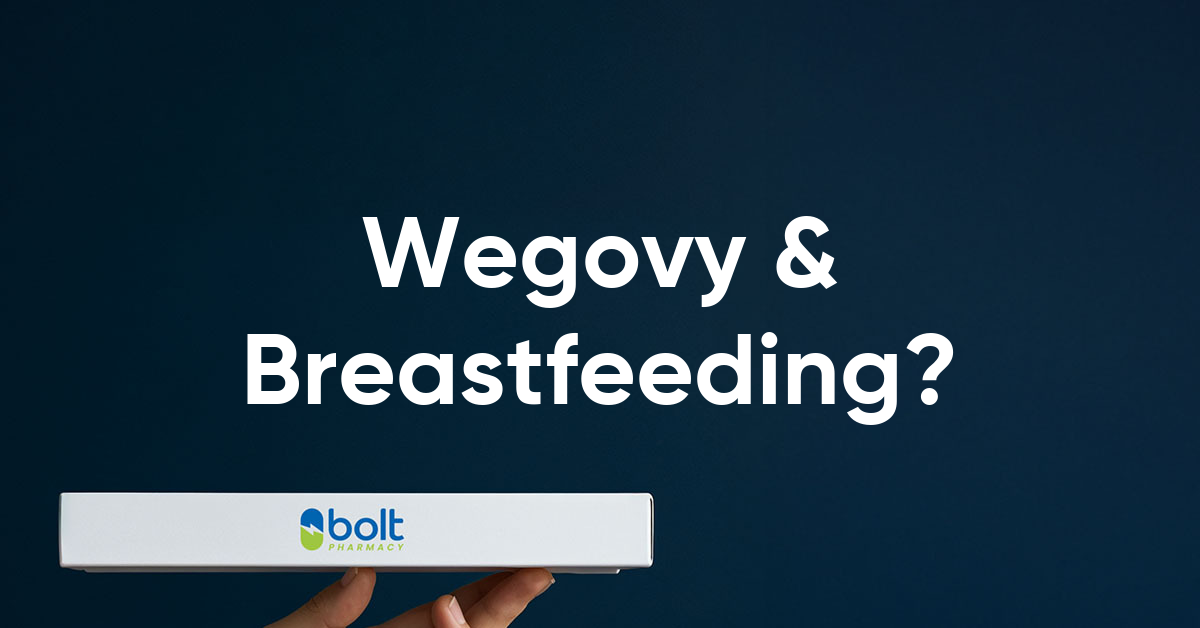Many new mothers wonder whether they can take Wegovy whilst breastfeeding to support postpartum weight management. Current UK guidance from the MHRA and manufacturer clearly states that Wegovy (semaglutide 2.4 mg) should not be used during lactation due to insufficient data on its transfer into breast milk and potential effects on nursing infants. This GLP-1 receptor agonist lacks robust clinical evidence regarding safety in breastfeeding populations. If you are breastfeeding and considering weight management options, it is essential to discuss safe, evidence-based alternatives with your GP or health visitor, as breastfeeding itself supports gradual, healthy weight loss whilst providing optimal nutrition for your baby.
Summary: Wegovy should not be taken whilst breastfeeding according to UK regulatory guidance due to insufficient safety data.
- Semaglutide is a GLP-1 receptor agonist that lacks clinical evidence regarding transfer into human breast milk or effects on nursing infants.
- UK guidance from the MHRA and manufacturer contraindicate Wegovy use during lactation due to unknown risks to the developing infant.
- Safe alternatives for breastfeeding mothers include balanced nutrition, gradual physical activity, and NHS behavioural support programmes.
- Wegovy can be considered once breastfeeding has fully ceased, with decisions made in consultation with your GP or specialist.
- Semaglutide has a half-life of approximately one week and should be discontinued at least two months before planned conception.
Table of Contents
Wegovy and Breastfeeding: Current UK Guidance
Wegovy (semaglutide 2.4 mg) should not be used during breast-feeding according to current UK regulatory guidance from the Medicines and Healthcare products Regulatory Authority (MHRA) and the manufacturer's Summary of Product Characteristics. This recommendation stems from the lack of sufficient data on whether semaglutide passes into human breast milk and what effects it might have on nursing infants.
Semaglutide is a glucagon-like peptide-1 (GLP-1) receptor agonist that works by mimicking a naturally occurring hormone to regulate appetite and blood glucose levels. Whilst animal studies have shown that semaglutide and its metabolites can be detected in the milk of lactating rats, there is currently no robust clinical evidence regarding its presence or concentration in human breast milk. The potential risks to the developing infant remain unknown, which is why healthcare professionals advise against its use during lactation.
The NHS and NICE guidance on weight management during the postnatal period emphasises that breastfeeding itself can support gradual, healthy weight loss, as it increases energy requirements. Women who are breastfeeding should focus on maintaining adequate nutrition to support milk production and their own recovery, rather than pursuing pharmacological weight loss interventions.
If you are currently breastfeeding and considering weight management options, it is essential to discuss your individual circumstances with your GP or specialist. They can provide personalised advice based on your medical history, weight management goals, and the age of your infant. Do not start Wegovy whilst breastfeeding without explicit medical guidance, as the safety profile in this population has not been established.

Alternative Weight Management Options for Breastfeeding Mothers
For women who are breastfeeding and wish to manage their weight, there are several evidence-based, safe alternatives that do not carry the uncertainties associated with pharmacological interventions like Wegovy. These approaches align with NICE guidelines on postnatal care and weight management.
Dietary modifications form the cornerstone of safe weight management during lactation. Rather than restrictive dieting, which can compromise milk supply and nutritional quality, focus on:
-
Consuming a balanced diet rich in whole grains, lean proteins, fruits, and vegetables
-
Maintaining adequate hydration (breastfeeding increases fluid requirements)
-
Avoiding excessive calorie restriction that could affect milk supply
-
Limiting processed foods, sugary drinks, and foods high in saturated fats
Physical activity is both safe and beneficial during the postnatal period, once you have been cleared by your healthcare provider (typically at the six-week postnatal check). Start gradually with low-impact activities such as walking, swimming, or postnatal exercise classes. The NHS recommends at least 150 minutes of moderate-intensity activity per week for general health, which can also support gradual weight loss.
Behavioural support programmes can be highly effective. Many areas offer NHS weight management services that may be suitable for postnatal women. Your GP, health visitor or midwife can advise on local availability. These programmes typically provide:
-
Structured goal-setting and monitoring
-
Peer support
-
Evidence-based advice on nutrition and activity
-
Psychological support for sustainable lifestyle changes
Your health visitor, GP, or midwife can refer you to appropriate local services. The NHS Digital Weight Management Programme may also be available for eligible individuals with certain health conditions. Remember that gradual weight loss (about 0.5–1 kg per week) is safest and most sustainable, as recommended by the NHS, and breastfeeding should not be compromised in pursuit of weight loss goals.
When Can You Safely Start Wegovy After Breastfeeding?
The decision about when to start Wegovy after stopping breastfeeding should be made in consultation with your GP or specialist weight management service. In the UK, Wegovy should be started only once breastfeeding has fully ceased. There is no officially mandated waiting period specified in UK guidance, as semaglutide's presence in breast milk and its elimination timeline have not been fully characterised in clinical studies.
From a pharmacological perspective, semaglutide has a half-life of approximately one week according to the Summary of Product Characteristics, meaning it takes around five to seven weeks for the medication to be substantially eliminated from the body after the last dose. However, this relates to clearance from the maternal system rather than specific data about breast milk concentrations.
Practical considerations when planning to start Wegovy post-breastfeeding include:
-
Ensuring your infant is fully established on alternative nutrition (formula or solid foods, depending on age)
-
Understanding the difference between the licensed indication and NHS access criteria
-
Discussing your complete medical history, including any pregnancy or postnatal complications
-
Understanding that Wegovy is prescribed as part of a comprehensive weight management programme, not as a standalone treatment
The licensed indication for Wegovy is for adults with a BMI ≥30 kg/m², or ≥27 kg/m² with weight-related comorbidities. However, NHS access via NICE guidance (TA875) is more restrictive, requiring treatment through specialist weight management services, with stricter BMI thresholds and specific comorbidity criteria. NHS treatment is also time-limited (up to 2 years).
If you are planning another pregnancy, discuss this with your doctor, as Wegovy should be discontinued at least two months before conception due to its long half-life and unknown effects on foetal development. Effective contraception is advised while taking Wegovy.
Important Considerations Before Starting Wegovy
Before initiating Wegovy treatment, whether post-breastfeeding or in any other context, there are several critical factors that require careful evaluation with your healthcare provider.
Medical eligibility and contraindications must be thoroughly assessed. According to the UK Summary of Product Characteristics, Wegovy is contraindicated in individuals with:
-
Hypersensitivity to semaglutide or any of the excipients
-
Pregnancy (Wegovy should not be used during pregnancy)
Additionally, caution is required if you have a history of pancreatitis, diabetic retinopathy (if you have diabetes), or gallbladder disease, as semaglutide may increase risks in these conditions. While no dose adjustment is required for renal impairment, caution is advised due to potential dehydration risks, particularly during treatment initiation.
Common adverse effects should be anticipated and discussed. The majority of people starting Wegovy experience gastrointestinal symptoms, particularly during dose escalation. These include:
-
Nausea (very common, affecting more than 1 in 10 people)
-
Diarrhoea, constipation, or vomiting
-
Abdominal pain or bloating
-
Reduced appetite (this is part of the therapeutic effect)
These symptoms typically improve over time as your body adjusts to the medication. However, you should seek urgent medical attention if you experience severe, persistent abdominal pain (which could indicate pancreatitis), right upper quadrant pain/fever/jaundice (possible gallbladder disease), signs of dehydration, or any symptoms of an allergic reaction. People with diabetes taking insulin or sulfonylureas should be aware of increased hypoglycaemia risk.
Treatment review and continuation follows specific guidelines. The manufacturer advises reassessing response after approximately 20 weeks at the maintenance dose of 2.4 mg, considering discontinuation if weight loss is inadequate. Under NICE guidance for NHS treatment, therapy is provided within specialist weight management services for a maximum of 2 years.
Lifestyle commitment is essential for success. Wegovy is licensed for use alongside a reduced-calorie diet and increased physical activity. Treatment is typically reviewed at regular intervals, and continuation depends on achieving meaningful weight loss.
Finally, Wegovy is administered as a once-weekly subcutaneous injection and requires refrigerated storage. If you experience any suspected side effects, report them via the MHRA Yellow Card scheme (yellowcard.mhra.gov.uk or the Yellow Card app).
Scientific References
- Wegovy 0.25 mg, FlexTouch solution for injection in pre-filled pen - Summary of Product Characteristics.
- Semaglutide for managing overweight and obesity. Technology appraisal guidance [TA875].
- Ozempic (semaglutide) - Product Information.
- Maternal and child nutrition: nutrition and weight management in pregnancy and after childbirth. NICE guideline [NG247].
Frequently Asked Questions
Why is Wegovy not recommended during breastfeeding?
Wegovy is not recommended during breastfeeding because there is insufficient clinical data on whether semaglutide passes into human breast milk or what effects it might have on nursing infants. UK regulatory guidance advises against its use until breastfeeding has fully ceased.
What are safe weight management options for breastfeeding mothers?
Safe options include consuming a balanced diet without excessive calorie restriction, gradual physical activity after medical clearance, and NHS behavioural support programmes. Breastfeeding itself increases energy requirements and can support healthy, gradual weight loss.
How long after stopping breastfeeding can I start Wegovy?
Wegovy can be started once breastfeeding has fully ceased, with no officially mandated waiting period in UK guidance. The decision should be made in consultation with your GP or specialist weight management service based on your individual circumstances.
The health-related content published on this site is based on credible scientific sources and is periodically reviewed to ensure accuracy and relevance. Although we aim to reflect the most current medical knowledge, the material is meant for general education and awareness only.
The information on this site is not a substitute for professional medical advice. For any health concerns, please speak with a qualified medical professional. By using this information, you acknowledge responsibility for any decisions made and understand we are not liable for any consequences that may result.
Heading 1
Heading 2
Heading 3
Heading 4
Heading 5
Heading 6
Lorem ipsum dolor sit amet, consectetur adipiscing elit, sed do eiusmod tempor incididunt ut labore et dolore magna aliqua. Ut enim ad minim veniam, quis nostrud exercitation ullamco laboris nisi ut aliquip ex ea commodo consequat. Duis aute irure dolor in reprehenderit in voluptate velit esse cillum dolore eu fugiat nulla pariatur.
Block quote
Ordered list
- Item 1
- Item 2
- Item 3
Unordered list
- Item A
- Item B
- Item C
Bold text
Emphasis
Superscript
Subscript










